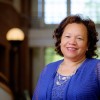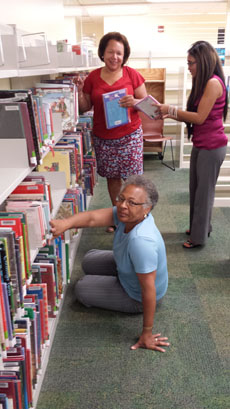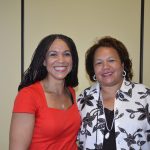This article is more than 5 years old.
Culture Keepers VIII: Challenges of the 21st Century – Empowering People, Changing Lives was the theme of this year’s conference of African American Librarians. The conference, sponsored by the Black Caucus of the American Library Association, was held August 7 – 11, in Covington, Kentucky. This conference, though probably not intentional on the planners, does more than inform and educate. It brings librarians of color together and magically fosters a spirit of acceptance, appreciation, collaboration and unity to those who attend. Many of the librarians in attendance come from institutions that have few folks who look like them within their staffing. At their state and local functions perhaps they’ll encounter a few others if they themselves attend. Of the speakers, we (librarians of color) are often thrilled if perhaps one of the keynoters is a minority, specifically an African American. So perhaps that helps you get just a glimmer of the pride I feel, and the motivation I get coming to this particular conference where at least 99% of the speakers and presenters are folks of color. Budgetary constraints, coupled with the host sight not being one of the popular let’s all go visit cities; attendance was lower than usual, around 215. Those low numbers however did not hamper at all the excitement you could see and hear throughout the convention center.
I volunteered for a community service project that involved supporting the local Kenton County Public Library which recently completed a 65,000 square foot, 12.5 million dollar renovation. The library has the largest genealogy collection in the country including a national Lieutenant Governor’s collection. Coincidentally this library was the first in the south to provide racially integrated service to all in their community. The volunteer project involved moving the children’s holiday collection from one sight to another. The books were already classed together by holiday, or so we thought. Our one dilemma occurred when we found books in the Christmas collection about Hanukkah shelved together with books on the Jewish Passover.
Dr. Melissa Harris Perry host of MSNBC’s weekend talk show was the opening keynoter. In a conversational styled interview, Melissa a Wake Forest University alumni, told the audience about her first library job here in the ZSR stacks, her steep learning curve as an assistant professor at the University of Chicago, her life as a black college student, woman and mother, and her work with Michele Obama in Chicago prior to the Obama election as President. Melissa shared the story behind how she became the Obama political expert. There was one statement she made that took me by surprise. When asked about her work as a student of theology she replied, I am searching for an answer. How is it that a people who have never known anything but generational bondage and inequality, would think that God loves them? The answer Perry says is not addressed in moral academic channels. Thanks to my colleague Julius Jefferson, I was able to have this photo taken with Dr. Harris Perry.
Conference programming planners gave attendees about two choices of workshops per schedule segment. Sometimes my choices were somewhat limited and focused heavily on the value of preserving African American heritage, culture and people. Empowering the Past: Telling Your Stories, gave examples on how one could take on the role of historian by collecting photographs and archives from their families to document the family history. An historical genealogy might include the political, the social, the sports great, the arts and entertainment and any other oddities that may have had an impact on the family and the life choices they’ve made. The example the presenter used detailed the life of her step father, a black plumber who worked on the “Hill District” a one-time thriving black area in Pittsburgh. Her photos and archival documentation depicted him as an ordinary man, a slave descendent, living through the Jim Crow era, raised as a sharecropper son, a World War II veteran, a worker in the steel mills and a black plumber who made weekly trips to the local Union requesting permission to join.
Giving Voice to Our Stories: Oral History as Integral to the Documentation and Preservation of African American History, was the title of the presentation given by Kelly Navies, Special Collections Librarian, District of Columbia Public Library. Her work focuses on collecting stories from the North Carolina Asheville area. Oral history is of particular importance to the African American community. It gives voices to members of the community who most would consider not worthy of historical documentation. We as Librarians are in a unique position with an opportunity to document gentrification and the closing of those schools valued by the African American community, racial profiling, return migration and incarceration. Generations of students will return again and again to hear these stories. They need to be captured. I regret not having my father tell me more about his service in World War II. I know he was stationed in Germany and that he was responsible for bringing ammunition to the troops, but little else. I seem to know more about the mistreatment he received upon his return to the United States. Perhaps that’s what stood out the most to him.
And yes there were numerous sessions on health and wellness efforts in the black community. One session encouraged attendees to pursue a complete state of physical, mental and social well-being. Pursuing wellness is not only a personal benefit but also one that will advance and preserve a community of people. The author also addressed the implications of mental health and how it is responded to within the black church. Added stress levels which studies have shown have a direct correlation to cultural identity and all the “stuff” that comes with that. Documented incidents of invasive and horrendous treatment of African Americans and test subjects compel many African American to question the safety of clinical trials. A panelist of doctors shared insight coming from both angles. To see the worst of what can happen in clinical trials, check out this sight. http://www.holeinthehead.com/
To end on a much happier note, let me share how pleased I am about Lynn’s plan to implement the “Sutton Rule” (after the NFL’s Rooney Rule). As we search to fill future position vacancies, at least one of the candidates brought to campus must be a minority. I am very optimistic. It is so cool and worthy of duplication across the state within our North Carolina libraries. There we go again, leading by example!



7 Comments on ‘Culture Keepers VIII’
Thank you, Wanda, this such an informative post! Archives and oral histories are a very important way for people to document their past and who they are.
Thank you, Wanda, this is such an informative post! Archives and oral histories are a very important way for people to document their past and who they are.
Wanda, great post! I’m a huge fan of Melissa Harris Perry. I’m sure she was a excellent keynote. I wish we could get her back to WFU (and ZSR) more often!
I don’t think I understood how endemic the horrendous treatment of African Americans and test subjects was in this country until I read “The Immortal Life of Henrietta Lacks” (Thanks for suggesting it Roz!)It is a terrible part of America’s history.
Thanks for the Kenton County Public Library link. That is a very cool renovation!
Thanks for such a thoughtful and moving post, Wanda.
Thought provoking. Melissa and I were classmates. I enjoy watching her show and listening to her speeches. Wish I was there.
Inspirational report, Wanda. We will follow up on MHP and I loved seeing my friend Sylverna Ford!
I just asked that we order the documentary “A Hole in the Head.” It sounds like an interesting conference on an important topic.